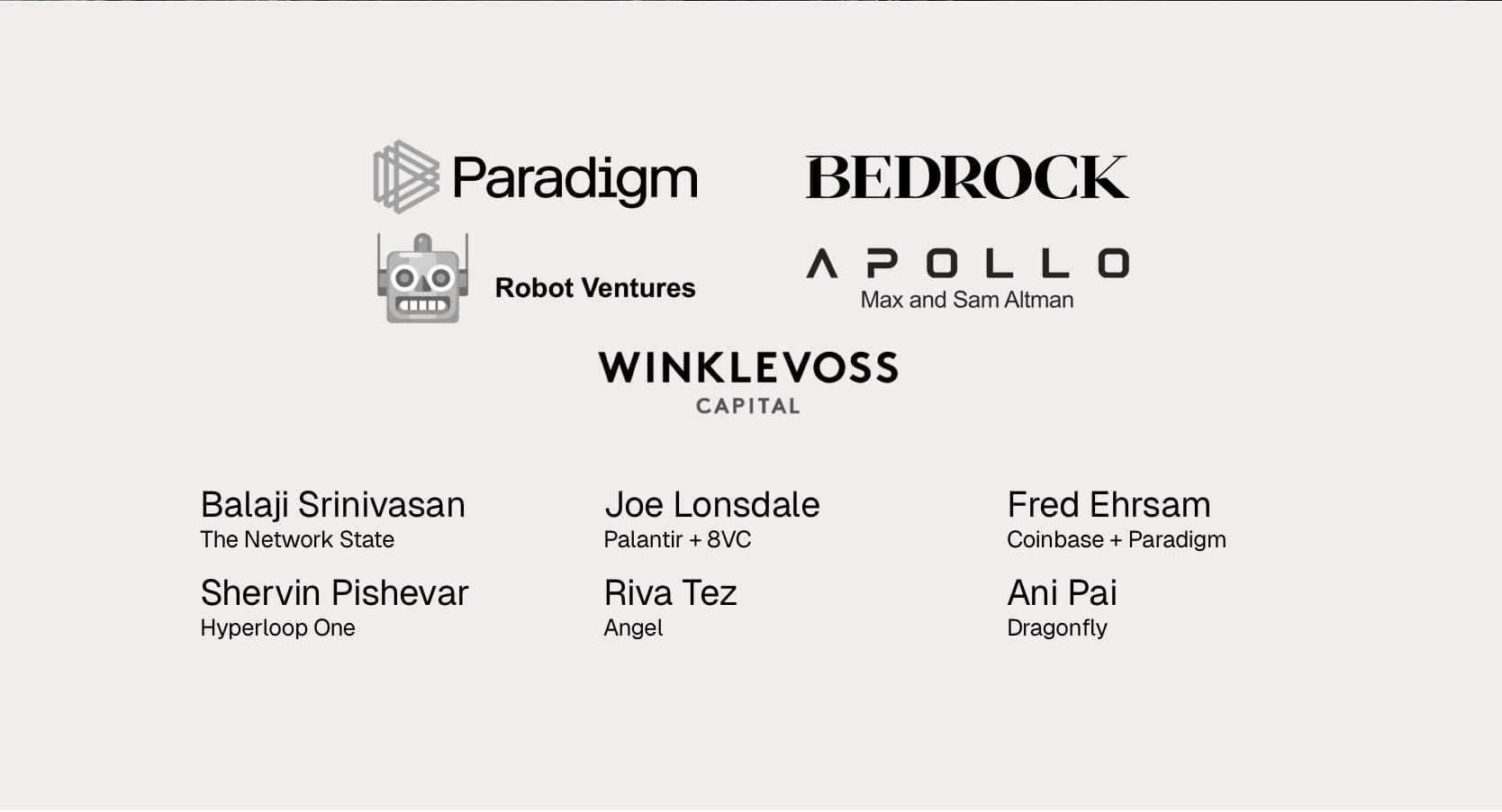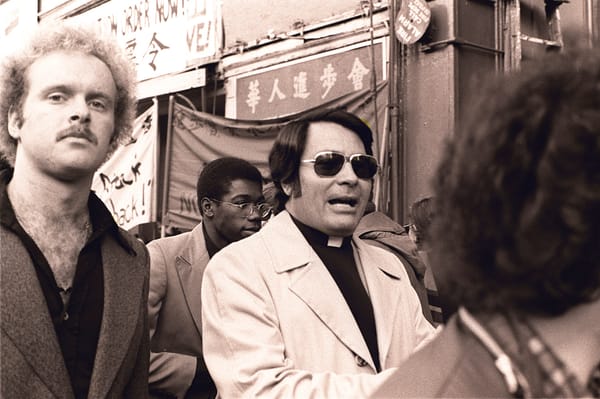Praxis: Tech dystopia as the 'Next America'
This isn't weird at all

The Point: Praxis, a company that claims to be building a new "nation" it markets as "the next America," has published a somewhat apocalyptic manifesto. It predicts that communities will "dissolve," nation-states will fall, and a privately-owned country will become the next global superpower. Scary stuff – especially when you consider the some of the big names backing this grandiosely dystopian idea.
From the manifesto:
Network States offer a path to crypto’s next wave of adoption by integrating onchain infrastructure into the parallel institutions supplanting the global system’s core functions.
(Yes, the image above is actually from the Praxis website, which claims the wannabe nation already has 13,718 members and is even selling merch.)
The Back Story: I've been keeping an eye on Praxis, which purports to be creating a new network state city somewhere in the Mediterranean. Last year, the New York Times wrote about the project and its young founder:
When he took the stage at a conference for “start-up societies” in Amsterdam in October, 27-year-old Dryden Brown cut a rumpled figure, moving stiffly in a gray hoodie with a T-shirt poking out at the bottom.
He was there to tout his company, Praxis, which has an ambitious goal: to create a new city on the Mediterranean.
The Santa Barbara native had never built a house before, let alone a city. A New York University dropout, he had been fired from his last job, at a hedge fund. He isn’t a charismatic speaker or an accomplished businessman. He’s big on promises and light on specifics, such as where on the 28,600-mile Mediterranean coast his city will be.
Nevertheless, he has raised $19.2 million for his project: a paltry amount in the worlds of venture capital and urban development — Hudson Yards, for example, cost $25 billion — but still a lot to fork over to a young man with no track record.
(Gift Link: Who Would Give This Guy Millions to Build His Own Utopia?")
Despite Brown's thin résumé, his company has drawn initial investments from Peter Thiel and Marc Andreessen (via Pronomos Capital), OpenAI CEO Sam Altman (via Apollo Projects), Joe Lonsdale (Palantir and 8VC), the Winklevoss twins, Fred Ehrsam (Coinbase and Paradigm) and others. Naturally, Network State evangelist Balaji Srinivasan is also involved. (The NYT story suggests that Thiel has distanced himself from Praxis, apparently because he doesn't think Brown can deliver. Thiel-backed Pronomos Capital is not listed on Praxis's website, but Praxis remains listed on Pronomos's website.)

Such an impressive roster of investors ... and yet, the NYT described Praxis as "part of a creepy internet subculture that has drawn reams of news media coverage as a fascist breeding ground within the American right."
An internal company branding guide reviewed by the NYT revealed some concerning things:
The guide denounces “enemies of vitality,” who “reject what they consider the optional ‘European beauty standards.” It goes on to extol “traditional, European/Western beauty standards on which the civilized world, at its best points, has always found success.”
Beauty, here, connotes proper breeding: “In humans, beauty implies a number of things — namely that two people, themselves of beauty, formed a union to create more beautiful life,” it reads.
Perhaps these weird politics aren't too surprising. Thiel's antipathy toward liberal democracy is well-documented. Andreessen and Lonsdale are openly pro-Trump, and Srinavasan's extreme techno-fascist ideas for persecuting and purging Democrats in San Francisco have been covered extensively in this newsletter.
But it's interesting to see Altman publicly associate himself with Praxis. In 2024, he's trying to position himself as a 21st century Robert Oppenheimer, someone who can be trusted to guide the development of powerful artificial intelligence systems. This requires political credibility, so it would seem wiser for Altman to stay away from extreme projects that seek to...replace the USA.
Then again, Altman has strange politics. For one thing, he's a longtime associate of Thiel, whom he regularly praises. In addition, Altman gave a maximum donation to Michael Shellenberger's 2022 campaign for California governor – a numbskull move that's troubling for two different reasons. First, Shellenberger had no chance of winning. Second, Shellenberger is quite an extreme character. He went from the far left to the far right – and from environmental activist to climate denialist. Today, posing as a journalist, he has become Elon Musk's favorite disinformation agent.
The fact that Altman thinks Shellenberger should be governor of the nation's most populous state says a lot. While Altman masks himself in awkward boy wonder vibes, his politics are rotten and decidedly right-wing – or worse. His investment in Praxis makes it clear that, despite platitudes about creating a better future, he's betting on some kind of dramatic collapse.
The Praxis Manifesto
I mentioned the Praxis manifesto, titled "The Network State: Crypto's End Game," in my recent New Republic piece on Coinbase CEO Brian Armstrong. But the document itself is worth a read.
To be honest, I found myself both deeply disturbed – and somewhat overjoyed – while reading it. Why joy? Because this Network State stuff is so crazy that writing about it can make you seem like a conspiracy theorist. So it was a relief to see Praxis validate my reporting by declaring that its plan is to unseat nations and take over the world.
From the manifesto (posted to the Praxis website on Sept. 18):
As local communities dissolve and Nation States stumble, Network States will ascend. Soon, Network States will be your most important group affiliation, passport, and community. Network States will represent Citizens controlling trillions dollars of assets, represented on their native asset registries. We’ll watch the flippening of Network States over Nation States in real time. Network States will coalesce neighborhoods and build cities. The next global superpower will be a Network State. The next America will be onchain.
There's plenty of tech-speak gobbledygook in the manifesto, but this paragraph really captures its heart. The entire piece is short, so I encourage you to read it for yourself:

Click here to read the full manifesto
Analysis: As I said in my New Republic piece, it's bizarre to see an American business interest speaking about the United States of America in this way.
One generally held principle in both business and politics is that one must always be loyal to the nation. America – the best, the greatest, the brightest, etc. To speak ill of the nation is to chip away at your own base ... unless, of course, you're selling a network state. Then, you need to chisel away at your potential customer's loyalty to country, creating a nagging dissatisfaction that can only be salved by your kooky crypto internet secession plan.
Praxis is selling a vision largely dependent on American collapse and defeat. Our communities will "dissolve" – what does that mean? And how will a corporation owned by tech bros provide a solution? Will it serve everyone? Doesn't seem like it. If anything, these network states sound like bespoke communes for the wealthy and powerful. The "Next America," but for rich (and mostly white) men only.
Praxis also claims that a network state (presumably Praxis) will be the "next global superpower." Yet being a superpower generally means having a very capable military and nuclear weapons. So this is either a fantastical boast, or an indicator of something even more nefarious than it already looks.
Founding Father fetish
Last week, I tweeted about Praxis and its big scary plans for the future. This drew a response from Brown, the CEO of Praxis:
I'm the CEO of Praxis. We are building a Network State to restore Western Civilization and accelerate technological progress.
(From the NYT piece on Brown: "In September, Mother Jones published an exposé about Mr. Brown’s politics, reporting that he had urged staff to read the fascist writer Julius Evola. According to a former Praxis employee who signed a nondisclosure agreement, Mr. Brown’s book collection in the so-called Praxis Embassy also included the memoirs of Albert Speer, Adolf Hitler’s architect, and “Imperium,” an influential 1948 title that calls for the establishment of a neo-Nazi empire in Europe.")
More interesting, however, was the response from Viktor Bunin, an employee of Coinbase.
I had asked: "What’s the word that describes when a group of people tries to undermine/unseat their own country and form a rival power?"
"The Founding Fathers," replied Bunin, attaching an image of George Washington and fellow Founders.

Network State types often bring up the Founding Founders. They seem to fancy themselves as a new generation of nation builders who will somehow improve upon the project of their celebrated predecessors (by destroying it, apparently).
"I think...you know...the Founding Fathers...and I studied, like, just a little bit...I'm not an expert...I think they were obviously, like, geniuses," said Coinbase CEO Brian Armstrong during a recent podcast interview. "It was this huge breakthrough. And, like, the American experiment has a long way to go, but it's...I do think America is in slow decline right now. Europe is in decline. Like, there's all these issues. Freedom of speech is under attack. You know, there's...so I do think, with humility, we all should be thinking about, how do we extend that experiment that the Founding Fathers started in America and sort of preserve freedom?"
It's easy to see why self-aggrandizing tech bros wish to lionize themselves by comparing themselves to Washington, Jefferson, Hamilton, Madison and company. But they seem to be missing an important part of the story.
In launching the American Revolution, the Founding Fathers put everything on the line. If they had failed, they would have been convicted of high treason and sedition. The consequences would have been severe.
It's hard to imagine tech billionaires – keyboard warriors – having an appetite for such existential risk.
Conclusion: The Praxis company's bombastic pronouncements give off a whiff of desperation. Its over-the-top claims to be creating the Next America are certainly designed to get attention. Whose attention, though? Regular people who are ready to abandon the USA for a shaky, unproven concept run by a guy who enjoys reading fascists? Or spacey billionaires who might be seduced into the next round of investment?







